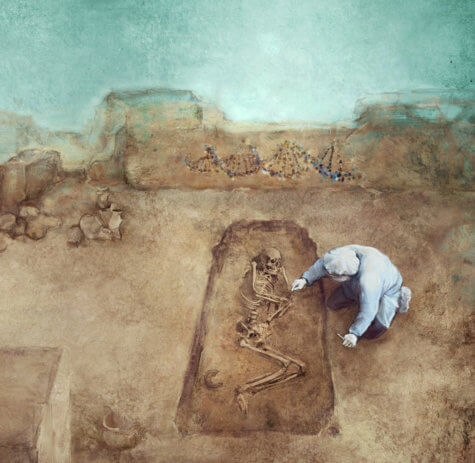November 27, 2025 | 04:08 GMT +7
November 27, 2025 | 04:08 GMT +7
Hotline: 0913.378.918
November 27, 2025 | 04:08 GMT +7
Hotline: 0913.378.918

Drawing of a scientist working with human skeletal remains and ancient DNA. Photo: Marija Stojkovic / Penn State University
Farming, of course, gets more food for less work, but initially ditching foraging might have been bad for Neolithic men’s health. The finding is based on limb bones from 167 prehistoric adults who lived either before or after humans began growing their own crops.
“Recent studies tried to characterize the contribution of DNA to height,” says lead author Dr. Stephanie Marciniak, of Penn State University, in a statement. “We started thinking about the longstanding questions around the shift from hunting, gathering and foraging to sedentary farming and decided to look at the health affect with height as a proxy.”
The researchers’ model also combined signs of stress in the skeletal remains and gene mapping. “Our approach is unique in that we used height measurements and ancient DNA taken from the same individuals,” says Marciniak.
The subjects studied lived between 38,000 and 2,400 years ago, a time span that includes pre-agriculture and the earliest and subsequent farmers. A computer model showed those from the Neolithic were 1.5 inches shorter than their predecessors. Moreover, these people were also almost an inch shorter than subsequent individuals.
Also known as the New Stone Age, the Neolithic marks the birth of agriculture. Heights steadily increased through the Copper (0.77in), the Bronze (1.06in) and the Iron (1.29in) ages, with respect to the Neolithic. Settled farming communities occurred across Europe at different times.
For instance, they emerged in the Levant and Britain around 10,200 and 6,000 years ago, respectively.
“Right now, what we know is 80% of height is from genetic makeup and 20% is from the environment. Researchers haven’t yet identified all the genetic variants associated with for height,” explains Marciniak.
The study, published in the Proceedings of the National Academy of Sciences, also investigates genetic ancestry.
“There was movement of people, generally from east to west. We wanted to account for that migration that perhaps brought different proportions of height-associated genetic variants,” Marciniak adds.
It is difficult to envision a world without farms. But as recently as 10 millennia ago, only in the Middle East had people turned from hunting and gathering. The effect has fascinated public health experts for decades.

Rows of growing corn on a farm. Photo: Steven Weeks on Unsplash
Diets became monotonous, and a narrower range of food courted disaster from failed harvests. More people packed together for longer periods increased the risk of disease from contaminated water, food and soil. Social mechanisms developed to adjudicate disputes, dampening tensions that could tear communities apart. People had to defend themselves, their land and stored food from neighboring groups because it was no longer easy to move away from sources of conflict.
“This research requires more study with larger datasets. Our work represents a snapshot of something that is very dynamic and very nuanced,” says Marciniak. “We need to do more to see what is the cause of the decrease in achieved height versus predicted genetic height during the shift to farming.”
The researchers say they believe that their approach is adaptable to studies of past human health, and could be applied in other contexts.
(Studyfinds)

(VAN) A new study reveals how the simultaneous effects of ocean acidification, salinity and loss of oxygen are making the world more fragile.

(VAN) Hopes are growing that the creation of the first 3D turkey gut model could be a turning point in the battle against the virulent blackhead disease.

(VAN) Tyson, America’s biggest meat supplier, plans to shutter one of its largest beef processing plants as the industry continues to struggle with low cattle supplies and political pressure from Washington.

(VAN) New FAO study shows how digital solutions are empowering farmers and fishers to prevent losses and build resilient agrifood systems.

(VAN) Brazil's COP30 presidency pushed through a compromise climate deal on Saturday that would boost finance for poor nations coping with global warming but that omitted any mention of the fossil fuels driving it.

(VAN) Poultry farmers in the UK have been warned that they could face one of the worst winters yet for bird flu.

(VAN) Prices of main-crop paddy have risen sharply, with jasmine rice hitting 16,100 baht per tonne — the highest level in years.